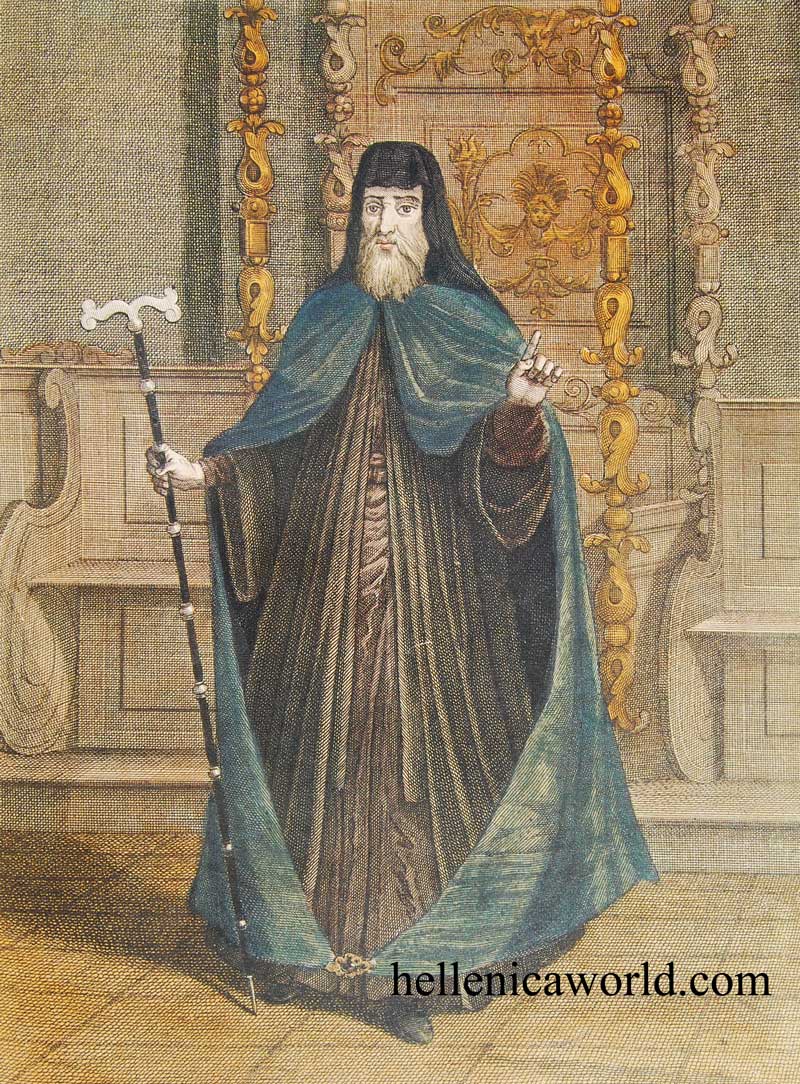.

Kyrillos Loukaris
Kyrillos Loukaris or Cyril Lucaris born Constantine Lukaris or Loucaris (1572–1638, Greek: Κύριλλος Λούκαρις) was a Greek prelate and theologian, and a native of Candia, Crete (then under the Republic of Venice). He later became the Greek Patriarch of Alexandria as Cyril III and Ecumenical Patriarch of Constantinople as Cyril I. Loukaris strove for a reform of the Eastern Orthodox Church along Protestant and Calvinist lines.[1] Attempts to bring Calvinism into the Orthodox Church were rejected, and Cyril's actions and motivations remain a matter of debate among the Orthodox.
Life
Kyrillos Loukaris was born in Candia, Crete on 13 November 1572,[2] when Crete was part of the Venetian Republic's maritime empire. In his youth he travelled through Europe, studying at Venice and Padua, and at Geneva where he came under the influence of the reformed faith as represented by John Calvin. Lucaris pursued theological studies in Venice and Padua, Wittenberg and Geneva where he came under the influence of Calvinism and developed strong antipathy for Roman Catholicism.[3]
In 1596 Lucaris was sent to Poland by Meletios Pegas, Patriarch of Alexandria, to lead the Orthodox opposition to the Union of Brest-Litovsk, which proposed a union of Kiev with Rome. For six years Lucaris served as professor of the Orthodox academy in Vilnius (now in Lithuania).[3]
Due to Turkish oppression combined with the proselytization of the Orthodox faithful by Jesuit missionaries, there was a shortage of schools which taught the Orthodox Faith and the Greek language. Roman Catholic schools were set up and Catholic churches were built next to Orthodox ones, and since Orthodox priests were in short supply something had to be done. His first act was to found a theological seminary in Mount Athos, the Athoniada school.
He sponsored Maximos of Gallipoli to produce the first modern Bible translations into Greek.
Calvinism
However his ultimate aim was to reform the Orthodox Church along Calvinistic lines, and to this end he sent many young Greek theologians to the universities of Switzerland, the northern Netherlands and England. In 1629 he published his famous Confessio (Calvinistic doctrine), but as far as possible accommodated to the language and creeds of the Orthodox Church. It appeared the same year in two Latin editions, four French, one German and one English, and in the Eastern Church started a controversy which culminated in 1672 with the convocation by Dositheos, Patriarch of Jerusalem, of the Synod of Jerusalem by which the Calvinistic doctrines were condemned.[3]
Cyril was also particularly well disposed towards the Church of England, and his correspondence with the Archbishops of Canterbury is extremely interesting. It was in his time that Mitrophanes Kritopoulos - later to become Patriarch of Alexandria (1636–1639) was sent to England to study. Both Lucaris and Kritopoulos were lovers of books and manuscripts, and many of the items in the collections of books and these two Patriarchs acquired manuscripts that today adorn the Patriarchal Library.
Politics
Lucaris was several times temporarily deposed and banished at the instigation of both his Orthodox opponents and the Catholic French and Austrian ambassadors,[3] while he was supported by the Protestant Dutch and English ambassadors to the Ottoman capital. Finally, when the Ottoman Sultan Murad IV was about to set out for the Persian War, the Patriarch was accused of a design to stir up the Cossacks, and to avoid trouble during his absence the Sultan had him killed by the Janissaries on June 27, 1638 aboard a ship in the Bosporus.[3] His body was thrown into the sea, but it was recovered and buried at a distance from the capital by his friends, and only brought back to Constantinople after many years.[3]
Legacy
Lucaris' position in Eastern Orthodoxy continues to be a matter of debate in the church. Some Orthodox accept the view of most secular historians that he was an advocate of Calvinism. Others say his personal position was distorted by his enemies, and that he remained loyal to Orthodox teachings.
References
General
"Kyrillos III Loukaris (1601–1620)". Official web site of the Greek Orthodox Patriarchate of Alexandria and All Africa. Retrieved 2011-02-07.
Specific
^ Kiminas, Demetrius (2009). The Ecumenical Patriarchate. Wildside Press LLC. p. 38,9. ISBN 9781434458766.
^ C. Emerau (1926). "Lucar Cyrille". Dictionnaire de Theologie Catholique. 9. Paris: Letouzey et Ané. 1003-19.
^ a b c d e f "Lucaris, Cyril." Encyclopædia Britannica. 2008. Encyclopædia Britannica Online. 26 Mar. 2008
Further reading
Pichler, Life, (Munich, 1862)
This article incorporates text from a publication now in the public domain: Chisholm, Hugh, ed (1911). Encyclopædia Britannica (11th ed.). Cambridge University Press.
External links
| Ancient Greece
Science, Technology , Medicine , Warfare, , Biographies , Life , Cities/Places/Maps , Arts , Literature , Philosophy ,Olympics, Mythology , History , Images Medieval Greece / Byzantine Empire Science, Technology, Arts, , Warfare , Literature, Biographies, Icons, History Modern Greece Cities, Islands, Regions, Fauna/Flora ,Biographies , History , Warfare, Science/Technology, Literature, Music , Arts , Film/Actors , Sport , Fashion --- |
From Wikipedia, All text is available under the terms of the GNU Free Documentation License

